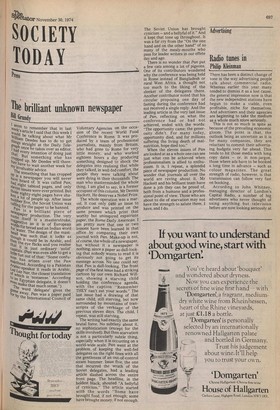The brilliant unknown newspaper
Rill Grundy 'Seem to remember that in last ,week's article I said that this week I 0.1ild be talking about what Mr ZiWarn Deedes has to do to get `flings straight at the Daily Telera, Ph once he takes over as editor. 'n „"ad every intention of doing just at. But something else has r°131:led tiP. Mr Deedes will thereore have to wait another week for rilY invaluable advice. The something that has cropped thIll is a newspaper you will never Lave heard of. It was called Pan, ";atl eight tabloid pages, and only teu Leven issues were ever printed. But eighty-eight. pages have shakP()se 4.1 a lot of people up. After issue LiMber five, the Soviet Union was Calling for the paper to be banned. n:cin is a brilliant piece of `WsPapier production. The very nam e itself is a masterstroke, "w"ggestive as it is of European f,°rfis far bread and an Indian word hs'r Water. The design of the mastWas such that it looks as tL'Ugh it could be in Arabic, and ti:en the eye flicks and you realise 'Lat it is just ordinary 'solid' coPitai s. an was even able to get a out of that: "Some confu;°n has arisen over the Pan esthead. According to a Pakistan LTabie-speaker it reads in Arabic, o'?z Luz Nor, the closest translation to which is 'nonsense.' According .e EgYptian delegate, it doesn't veri Make that much sense.") n The word 'delegate' gives the F:r nle away. Pan was a paper paid bY the International Council of
Voluntary Agencies on the occasion of the recent World Food Conference in Rome. It was produced by a team of professional journalists, mainly from Britain, who had gone to Rome for very little money, and who worked eighteen hours a day producing something designed to shock the delegates into realising that while they talked, in well-fed comfort, the people they were talking about were dying in their thousands. The man who masterminded the whole thing, I am glad to say, is a former occupant of this column, Mr Dennis Hackett. He deserves a Nobel Prize.
The whole operation was a marvel. It cost only £400 an issue to produce and was printed on the same presses which print that worthy but uninspired expatriate paper, the Rome Daily American. I am pretty sure that one or two lessons have been learned in that office by comparing their own journal with Pan. Make-up is not, of course, the whole of a newspaper, but without it a newspaper is nothing, since a paper so dull-looking that nobody wants to read it is obviously not going to get its message across. No one could say that Pan is dull-looking. The front page of the first issue hada striking cartoon by our own Richard Willson, showing a starving child holding the conference agenda, with the caption "Remember THEY can't eat your words." The last issue had a drawing of that same child, still starving, but now surrounded by mountains of transcripts of the verbiage of the previous eleven days. The child, I repeat, was still starving.
The writing had exactly the same brutal force. No subtlety about it, no sophistication (except for the skills involved). But then starvation is not a particularly subtle thing, especially when it is occurring on a world-wide scale. Pan went at the problem of keeping the well-fed delegates on the right lines with all the gentleness of an out-of-control steam hammer. Issue five, the one that incurred the wrath of the Soviet delegates, had a leading article slashed across the entire front page. The headline, in the boldest black, shouted "A bellyful of cynicism." The article started with the words "Some have brought food, if not enough; some have brought money, if not enough. The Soviet Union has brought cynicism and a bellyful of it." And it kept that tone up throughout. It was a far cry from the "On the one hand and on the other hand" of so many of the mealy-mouths who pass for leader writers in our effete day and age. There is no wonder that Pan put a few cats among a lot of pigeons. One of its contributors wondered why the conference was being held in Rome instead of Bangladesh or rural West Africa, a thought not too much to the liking of the sleeker of the delegates there. Another contributor noted that his circular proposing one day of fasting during the conference had not received a single reply. And the leading article in the very last issue of Pan, reflecting on what the conference had or had not achieved, ended with the words: "The opportunity came; the generosity didn't. For many today, opportunity died, and for millions suffering the living death of malnutrition, hope died too." When the eleven issues of Pan are looked at as a whole one can see just what can be achieved when professionalism is allied to enthusiasm. It is, I repeat, a splendid piece of newspaper production. No wonder that journals all over the world are raving about it. Mr Hackett and his brilliant team have done a job they can be proud of, both from a humane and a professional point of view. Those who are about to die of starvation may not have the strength to salute them. I have, and I do.










































 Previous page
Previous page